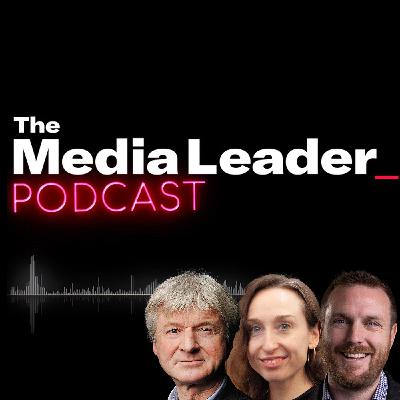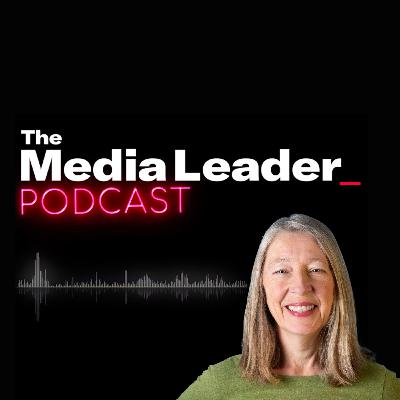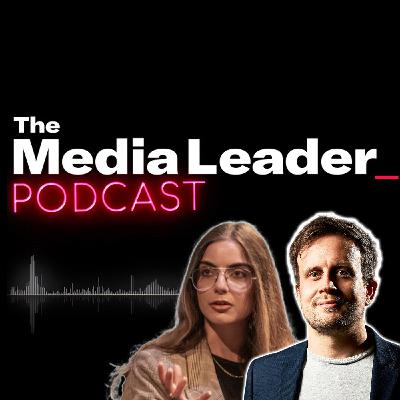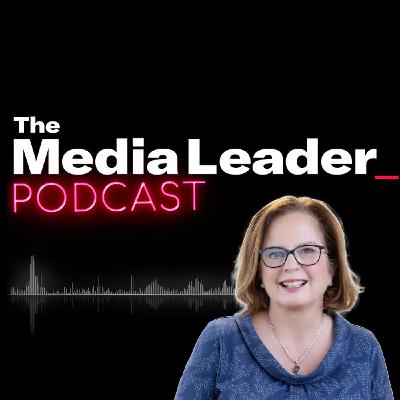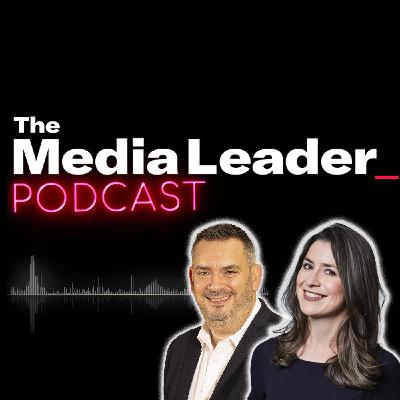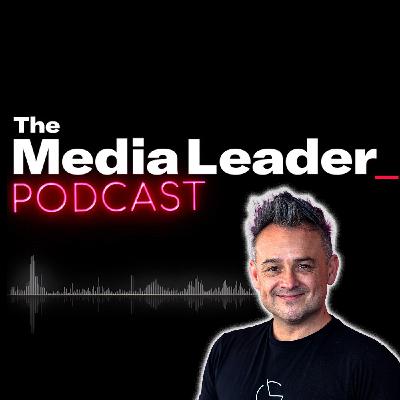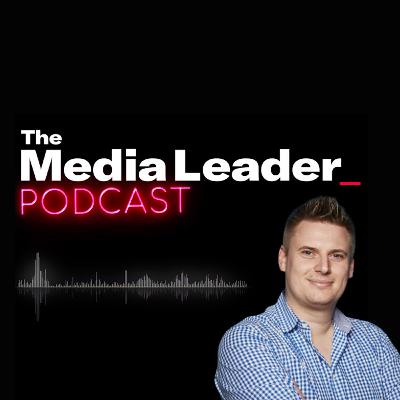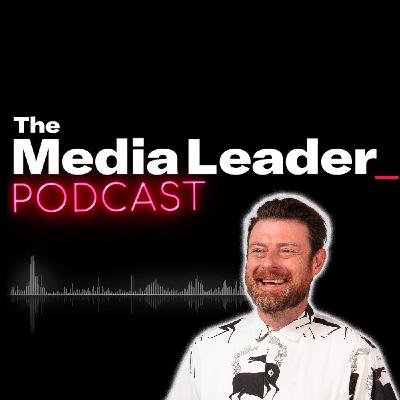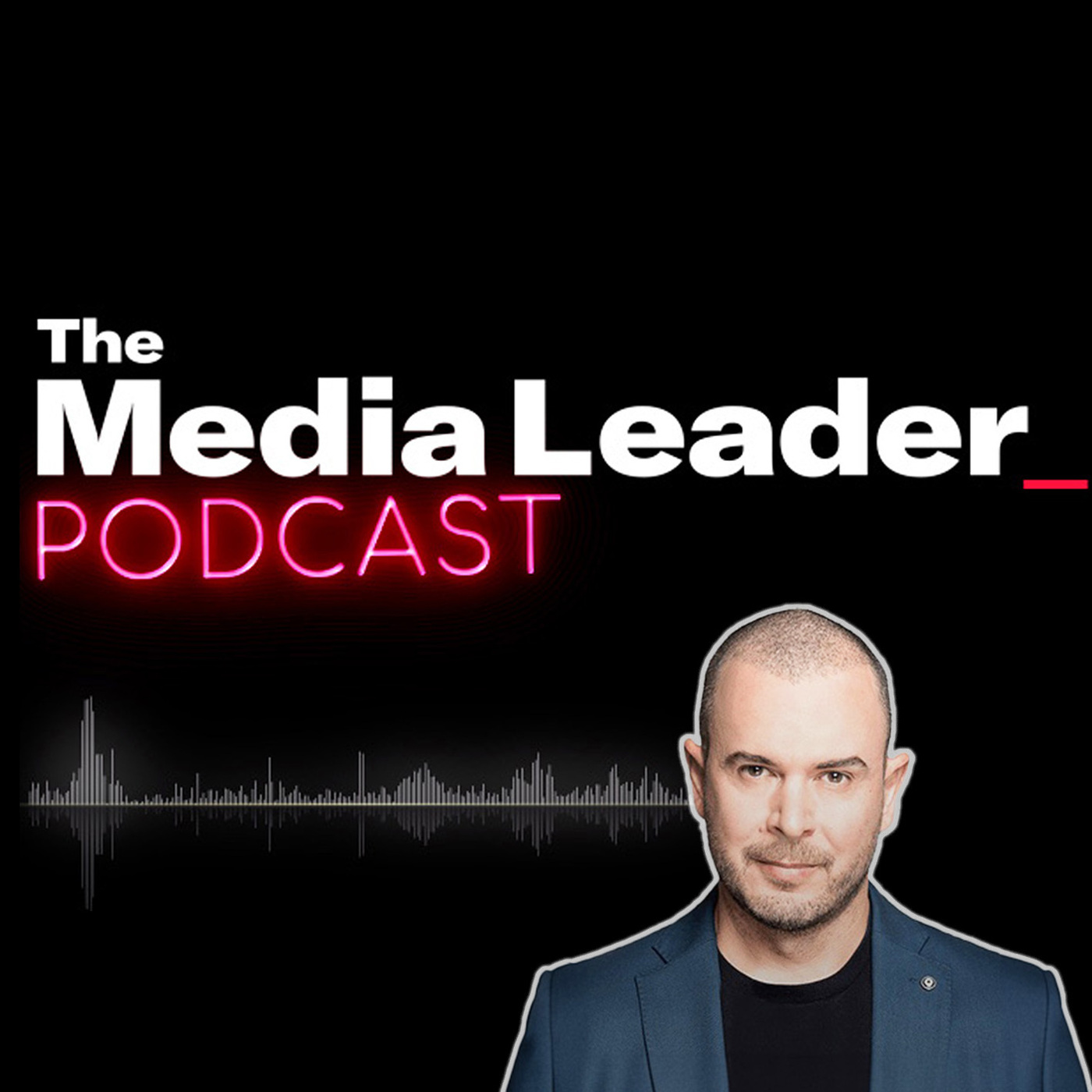Discover The Media Leader Podcast
The Media Leader Podcast

The Media Leader Podcast
Author: The Media Leader
Subscribed: 17Played: 573Subscribe
Share
© Adwanted UK
Description
The Media Leader is the leading source of analysis, data, opinion and trends in commercial media and advertising.
Hosted by senior reporter Jack Benjamin, we speak to senior industry leaders and rising stars about the key challenges media faces as part of our mission to stand up for courage, inclusion and excellence in media.
Find out more at uk.themedialeader.com and subscribe to our daily newsletter.
206 Episodes
Reverse
It’s the most wonderful time of the year. Yes, yes, it’s the holiday season and we’re just days away from Christmas. But it’s also the global adspend report season. Business leaders are getting a holistic look at how the total ad market performed in the UK and around the world, and also what to expect for next year.WPP Media’s This Year Next Year report released on 8 December, and it has become something of an annual tradition to host its author and global president of business intelligence, Kate Scott-Dawkins, on this show before the end of the year.She returns once again to unpack this latest report, which forecast global ad revenue to grow 8.8% year on year to $1.14tn in 2025, despite persistent macroeconomic headwinds. Next year, WPP Media is predicting further 7.1% global growth, the majority of which is being captured by a handful of tech platforms.Scott-Dawkins offers her view on the state of the global economy, downside risks for marketers, and whether AI is likely to drive growth next year.This is the final episode of the podcast we at The Media Leader are releasing this year. Thank you to our wonderful guests and to all you listeners out there for tuning in. We’ll be taking a few weeks off the holidays but will be back up and running in the New Year.Highlights:1:50: Toplines: an optimistic forecast driven by platform growth6:12: Expect more consolidation9:33: Downside risks: tariffs, uncertain consumer spending, K-shaped recovery14:52: Advertising is leading the global economy17:56: Could the commerce market be upended by AI?20:20: Why the UK ad market is still "pretty healthy"22:33: Things to look out for in 2026: AI search, an upper-funnel correctionRelated articles:WPP Media forecasts 8.8% global ad revenue growth in 2025 but warns of ‘K-shaped economy’ risk‘Agencies may get squeezed everywhere’: US tariffs cause ad industry angstUncertainty and soft guidance as holding groups struggle for growth in Europe---Thanks to our production partners Trisonic for editing this episode.--> Discover how Trisonic can elevate your brand and expand your business by connecting with your ideal audienceVisit The Media Leader for the most authoritative news analysis and comment on what's happening in commercial media. LinkedIn: The Media LeaderYouTube: The Media Leader
This episode was produced in partnership with Roku.It's been a busy past few months for Roku: in the US, it launched a new low-cost subscription service, Howdy, which aims to be supplementary to the likes of Netflix and Disney+; in the UK, Roku launched 40 FAST channels on its platform.Last month, The Media Leader sat down with Roku’s content distribution director, Tom Price. If you haven’t listened, it’s worth your time – Price spoke about those developments, as well as how Roku works with its content partners to support their programming within the Roku platform.But that was only part 1 of a 2-part series produced in partnership with the company, timed to coincide with The Media Leader's focus on the future of TV at our annual Future of TV Advertising Global Event, held this week.For part 2 of the series, host Jack Benjamin is joined by Mike Shaw, the director of EMEA ad sales at Roku.Shaw discussed Roku's commercial strategy more broadly. He chatted about where Roku sits within the wider CTV ecosystem, how it’s working with retail media partners, innovations it would like to help drive in measurement, and how the TV market is changing to become more data-led and programmatic.Highlights:1:37: What will define the future of TV advertising?5:00: Growth and growing pains in CTV9:09: How to use data for brand and performance alike14:20: Linking CTV with retail media and driving innovation amid 'democratisation' of TV20:38: How Roku aims to grow market share in Europe: using TV OS for incremental reach26:36: The future of FAST and bundling amid subscription fatigueRelated articles:How Roku is piecing a fragmented TV landscape back together — with Tom PriceRoku launches FAST channels in UK marketHowdy confirms Roku’s growing interest in subscription streamingRoku eyes app bundling opportunity as next-gen aggregator---Thanks to our production partners Trisonic for editing this episode.--> Discover how Trisonic can elevate your brand and expand your business by connecting with your ideal audienceVisit The Media Leader for the most authoritative news analysis and comment on what's happening in commercial media. LinkedIn: The Media LeaderYouTube: The Media Leader
This episode was produced in partnership with The Guardian.Each year, The Guardian’s advertising team delivers a research project cheekily called Shift Happens.Blending survey data with first-party data, the study aims to unpack longer-term cultural trends in Britain that may well be of interest to savvy marketers.Imogen Fox is The Guardian's chief advertising officer. She returns to the podcast to unpack the report's key takeaways and its implications for marketers.These include five major changes consumers have made in how they spend their time throughout the week. Among them, people are waking up earlier, maximising weekends, heading to the pub early on Fridays, and taking reexamining their work-life balance priorities.Highlights:1:05: Shift Happens toplines5:00: How useful are trends reports?8:15: Lifestyle changes: joy slicing, return-to-office, weekend maximising, chatbot friends14:52: Advice for marketers20:40: The Guardian's plans for 2026Related articles:WTF happened to Friday?The Guardian promotes its creative canvas amid US investment driveIsn’t it time the ad industry embraces a 4-day week?---Thanks to our production partners Trisonic for editing this episode.--> Discover how Trisonic can elevate your brand and expand your business by connecting with your ideal audienceVisit The Media Leader for the most authoritative news analysis and comment on what's happening in commercial media. LinkedIn: The Media LeaderYouTube: The Media Leader
Last December, Phil Smith, the director-general of Isba (the trade body for advertisers), announced he would be stepping down after eight years.Succeeding him is Simon Michaelides, who most recently worked as the interim chief customer officer of Great British Racing.Both Isba's outgoing and incoming leaders joined host Jack Benjamin on the podcast to discuss Smith's legacy and Michaelides initialy priorities for Isba and its members.During Smith’s time at Isba, he was one of the key architects of Origin, the cross-media measurement service that he will now continue working on as its chairman. The trio spoke about Origin's next stage plans now that it officially launched this year.They also discussed a wide range of topics relevant to Isba's members, including the issue of principal media and whether it has reduced agency-client trust, the shifting TV market, and challenges facing CMOs.Highlights:5:17: Smith's legacy at Isba8:26: Making sense of the changing TV market12:55: The roadmap for Origin and early feedback from advertisers and media owners26:13: Michaelides' "relevance" agenda31:06: The agency-client relationship: consolidation, AI, principal media and trust42:00: Challenges for CMOs: rapid turnover, balancing the short and long term52:31: Should we have an Isba for SMEs?Related articles:Isba appoints Simon Michaelides director generalOrigin’s cross-media measurement solution has landed: A view from the bridgeIsba’s Phil Smith: Advertisers should take a bigger stake in OriginThree ways to access £15bn in adspend---Thanks to our production partners Trisonic for editing this episode.--> Discover how Trisonic can elevate your brand and expand your business by connecting with your ideal audienceVisit The Media Leader for the most authoritative news analysis and comment on what's happening in commercial media. LinkedIn: The Media LeaderYouTube: The Media Leader
PMG, an independent challenger ad agency, has gone on an investment spree. Over the past few months the agency has hired top talent, and in recent years it has acquired a number of businesses to build out a full-service offering for brands as it looks to challenge holding groups and other indies for business.One major addition it made last month was Josh Krichefski, the former GroupM EMEA and UK CEO, who is now PMG’s EMEA president.Krichefski is also notable for working as the president of IPA from 2023 to 2025, a role in which he championed industry talent and the importance of both acquisiton and retention.He joined The Media Leader recently to discuss his new role, PMG’s growth strategy and what sets it apart from competitor agencies amid a rapidly changing agency landscape.Krichefski also reflected on his time as IPA president and at WPP, and spoke about his views on the future of the agency model.Highlights:4:30: What attracted Krichefski to PMG after more than a decade at WPP9:43: PMG's go-to-market in EMEA: Transparency, consultancy, data27:01: Reflecting on Krichefski's time as IPA President and his People First agenda32:12: Agency consolidation and the future of the agency model38:26: Why AI is an opportunity, not a threatRelated articles:Josh Krichefski joins PMG as EMEA PresidentIPA president Josh Krichefski: ‘Put health and wellbeing at the forefront’WPP CEO labels group’s performance ‘unacceptable’ as it looks to SMEs‘We are in a crisis’: Advertising: Who Cares? suggests media business models must change---Thanks to our production partners Trisonic for editing this episode.--> Discover how Trisonic can elevate your brand and expand your business by connecting with your ideal audienceVisit The Media Leader for the most authoritative news analysis and comment on what's happening in commercial media. LinkedIn: The Media LeaderYouTube: The Media Leader
One of the key topics of industry research we at The Media Leader have been following is how media companies – be they agencies, owners or brands – can and should restructure themselves to become more fit-for-purpose in a changing media ecosystem.Independent marketing advisory MediaSense has been examining these issues for several years, and last month it released its latest report, in partnership with the World Federation of Advertisers, titled, The Future of Media Organisations. Based on responses from many of the world’s largest companies representing $52bn in annual media spend, the report found that media is emerging as a key way to connect disparate marketing functions – from creative to brand strategy. Media, in other words, is becoming less siloed.But that begs the question: how do businesses and their agencies reorganise to fit that new model?Ryan Kangisser is the chief strategy officer at MediaSense. He joins the podcast once again to explain the details of the study, their implications for marketers and agencies, and why integration – rather than scale – is the key to media success going forward.He remarks: "I think [brands] want full-service thinking, not necessarily full-service doing."Highlights:1:48: Toplines from The Future of Media Organisations report: breaking down siloes6:07: If media is taking a bigger role, who owns strategy?11:39: Developing the right data infrastructure to improve audience planning16:20: Global versus local: why there is an erosion of regional specialism24:03: How is the agency model changing?Related articles:Media’s strategic role in integrating marketing functions for brandsWhat’s the future role of media? It’s complicatedRethinking agency remuneration in 2025 — with MediaSense’s Ryan Kangisser---Thanks to our production partners Trisonic for editing this episode.--> Discover how Trisonic can elevate your brand and expand your business by connecting with your ideal audienceVisit The Media Leader for the most authoritative news analysis and comment on what's happening in commercial media. LinkedIn: The Media LeaderYouTube: The Media Leader
Last week, The Media Leader hosted its flagship annual event in London, The Future of Media, and for this week’s episode of the podcast, the team wanted to bottle one of the headline interviews from the conference.On Tuesday, host Jack Benjamin sat down with Niel Bornman, CEO of Publicis Media Connected UK.Publicis is having a big year – it is, by some margin, the strongest-growing of the major global media holding groups, to the point where its competitors are generally looking to emulate its business model.Bornman unpacked the moves the company has made in recent years to set it up for post-pandemic growth, and weighed whether its data-driven model is pushing advertisers more toward performance media.The pair also spoke about the future of the agency model, debated concerns around principal media, and discussed what needs to change to improve Publicis Groupe’s declining share price.Highlights:2:14: How Publicis' data-led model put it in a good post-pandemic position.5:08: Can Publicis maintain its USP as competitors look to emulate its business model?7:18: Are we over-investing in performance marketing?10:45: Boosting share price growth13:15: The future of the agency model in an era of AI19:00: Principal media: yay or nay?Related articles:‘We are in a crisis’: Advertising: Who Cares? suggests media business models must changeThe great media agency shake-upWho gains most from the agency shift to strategic partnerships with clients?Can principal media be good, actually?Podcast: What did Publicis get for $4.4bn? Interview with Epsilon UK MD Elliott Clayton---Thanks to our production partners Trisonic for editing this episode.--> Discover how Trisonic can elevate your brand and expand your business by connecting with your ideal audienceVisit The Media Leader for the most authoritative news analysis and comment on what's happening in commercial media.LinkedIn: The Media LeaderYouTube: The Media Leader
This episode was produced in partnership with Roku.It's been a busy past few months for Roku: in the US, it launched a new low-cost subscription service, Howdy, which aims to be supplementary to the likes of Netflix and Disney+; in the UK, Roku launched 40 FAST channels on its platform.The company has emerged as a key partner for other entertainment partners to increase the reach and viewability of their content, a goal that has become increasingly important in a fragmented TV landscape.Tom Price is the content distribution director at Roku. He joins host Jack Benjamin to discuss the latest developments at Roku, what makes the UK TV market unique, and how the company has developed a toolkit of advertising opportunities for its content partners.This is part one of a two-part conversation — be on the lookout later in the year for a follow-up interview with Roku's EMEA ad sales director Mike Shaw.Highlights:3:11: Roku's UK positioning: the pace of change, growth opportunities, FAST strategy.10:03: Cutting through the noise of a crowded streaming market.14:58: Howdy: Roku's US ad-free SVOD option.17:48: How Roku works with its content partners.25:07: What's next? Streaming market expansion and consolidation, FAST growth, new features.Related articles:Roku launches FAST channels in UK marketHowdy confirms Roku’s growing interest in subscription streamingRoku eyes app bundling opportunity as next-gen aggregator---Thanks to our production partners Trisonic for editing this episode.--> Discover how Trisonic can elevate your brand and expand your business by connecting with your ideal audienceVisit The Media Leader for the most authoritative news analysis and comment on what's happening in commercial media.LinkedIn: The Media LeaderYouTube: The Media Leader
At the heart of every media plan is the need to understand what a consumer wants; wants from your brand, your product, how they want to be spoken to and through what touchpoints.Michael Brown is the UK and EMEA head of research and insight, and a senior managing partner, at IPG Mediabrands.He joined host Jack Benjamin to discuss how his craft of both qualitative and quantitive consumer research is adapting to meet changing needs of CMOs, and how he is integrating AI into his work practice.Brown believes wholeheartedly that the human element is at the core of consumer insights, and he explains why it’s important for media companies and brands to continue taking that into account.As part of the conversation, the pair also spoke about key insights trends, including the seeping of politics into social listening online, and what it means for brands who have demonstrated care (or lack thereof) to diversity, equity and inclusion efforts.In addition, Brown addressed how he and his team are handling any uncertainty over Omnicom’s forthcoming acquisition of IPG.Highlights:3:14: How demand for research and consumer insight is changing, and the crisis of "information overload" in the age of AI.11:34: Why true insight and storytelling require a "human premium".16:41: How do CMOs take on research?20:44: What's trending right now? Social listening, Reddit, and political controversy.28:24: Are brands shying away from responsible media investment and diversity, equity and inclusion?33:52: Reactions to Omnicom's acquisition of IPG.37:47: Is the social culture of adland changing?Related articles:The ad gap: Why marketers are falling behind consumers, and how to catch up Consumers seeking comfort online more likely to view advertising positivelyUS FTC approves Omnicom-IPG merger on condition it does not make ad decisions based on ‘political or ideological viewpoints’---Thanks to our production partners Trisonic for editing this episode.--> Discover how Trisonic can elevate your brand and expand your business by connecting with your ideal audienceVisit The Media Leader for the most authoritative news analysis and comment on what's happening in commercial media. LinkedIn: The Media LeaderYouTube: The Media Leader
This year, the Molly Rose Foundation, the charity founded in the memory of Molly Russell, in partnership with online safety researchers, has released a number of studies around the efficacy of social media platforms’ online safety efforts.In August, it found that, despite platforms’ promises to get better on tackling the issue of child safety, the likes of TikTok and Instagram are still bombarding young users with a quote unquote “tsunami of harmful content” via their recommendation algorithms.Weeks later, another report found that most of Meta's child safety tools, including and especially its Teen Accounts feature, are apparently ineffective.Andy Burrows is the CEO of the Molly Rose Foundation. Joined by the Conscious Advertising Network's Harriet Kingaby and host Jack Benjamin, he explained the severity of the harms facing children on social platforms, and why their efforts to ameliorate them have been, in his words, "performative".After the recording of this episode, the Foundation released a third piece of research that found half of girls aged 13-17 saw high-risk suicide, self-harm, depression or eating disorder content in the week shortly prior to the Online Safety Act taking effect this summer.Responding to the MRF's research on its Teen Accounts, a Meta spokesperson said the report "repeatedly misrepresents our efforts to empower parents and protect teens, misstating how our safety tools work and how millions of parents and teens are using them today."Teen Accounts lead the industry because they provide automatic safety protections and straightforward parental controls. The reality is teens who were placed into these protections saw less sensitive content, experienced less unwanted contact, and spent less time on Instagram at night. Parents also have robust tools at their fingertips, from limiting usage to monitoring interactions. We'll continue improving our tools, and we welcome constructive feedback — but this report is not that."Burrows and Kingaby also discussed why advertisers haven’t yet been moved to apply business pressure on platforms in response, and whether regulation is plausible.Said Burrows: "This is a commercial decision, and children are paying the price."Highlights:2:07: Toplines of the MRF's research and how advertisers have reacted13:51: Malice, ignorance, or incompetence?17:01: Is anyone tackling child safety responsibly? Issues of transparency and trust and safety investment23:16: AI chatbots and child safety31:33: Is regulation plausible right now?37:17: How should parents navigate the online world on behalf of their kids?Related articles:Molly Russell charity CEO: Social media’s user safety efforts have been ‘performative’Why planners are investing so heavily in Meta, despite attention metricsUS TikTok sale brings uncertainty for creators amid free speech chillMeta launches subscription option to allow UK users to avoid ads---Thanks to our production partners Trisonic for editing this episode.--> Discover how Trisonic can elevate your brand and expand your business by connecting with your ideal audienceVisit The Media Leader for the most authoritative news analysis and comment on what's happening in commercial media. LinkedIn: The Media LeaderYouTube: The Media Leader
It's one thing to get your CFO's attention and a marketing budget approved. It's another to deploy that investment in a way that builds your brand and delivers on boardroom promises.In a break from our typical interview format, The Media Leader team wanted to bring you one further discussion held at last month's Future of Media Manchester event.To close the day, The Media Leader's content director James Longhurst hosted a panel on the challenges clients and agencies face throughout the year as they seek to meet and exceed boardroom expectations.How do you optimise for business KPIs? How do you balance short-term demands with long-term brand building when every pound spent is being scrutinised? How do you build the case for bigger media budgets during a business downturn?All these questions and more were tackled by: Neil Jones, head of performance media at Boots UK; Laura Kell, chief data and product officer at Havas Media Network UK; Stu Lunn, group managing director at Kinesso; and Rob Linton, managing director, regions at MiQ.The discussion will continue next month, when The Future of Media returns 4-5 November in London. Register here to attend.Highlights:2:16: The start of the budgeting year — how to make the CFO see marketing as an investment8:05: Why AI is being used to drive cost savings21:57: Balancing short-term KPIs and long-term needs34:45: How do you know you've kept your promises to the boardroom?Related articles:How brands can truly ensure their CEO, CFO and CMO work togetherHow to bridge the CEO-CMO gap? Marketers must take an ‘investor mindset’, McKinsey advisesAd industry positioned as key sector for driving economic growth---Visit The Media Leader for the most authoritative news analysis and comment on what's happening in commercial media. LinkedIn: The Media LeaderYouTube: The Media Leader
At The Media Leader's Future of Media Manchester event last week, effectiveness expert Peter Field and Newsworks insights director Heather Dansie presented new research that shows investing in high-attention media channels — TV, cinema, radio, news brands and magazine brands — is more profitable than investing in low-attention ones.And yet, over the past decade, adspend has flowed to social media and pure-play internet, and away from those channels.What accounts for this? And what would happen if marketers heeded effectiveness research that repeatedly indicates a severe over-investment in ineffective, short-termist digital media inventory?During the conference, Field and Dansie sat down with Lumen CEO and report co-author Mike Follett for a special live edition of the podcast with Jack Benjamin.The trio of industry-leading researchers unpacked the findings and criticised media planners for failing to responsibly invest their clients' money in media placements with long-term benefits."My suggestion to media planners is: do your fucking job," said Follett. "Don't take the easy thing. Actually think: where am I going to get the best result for my clients?"Highlights:1:12: Topline takeaways from the research5:38: Methodology and why smaller brands must embrace advertising beyond performance12:25: Why has ad investment shifted away from high-attention media? CFOs driving the agenda and lazy media planners19:05: Are all news brands equal?24:25: Why aren't evidence-based arguments sinking in?Related articles:High-attention media is more profitable, finds Peter Field, Lumen and NewsworksDigital adspend to grow by double digits in 2025 and 2026One-third of indie publishers could shut down by next year as AI search hits trafficAre advertisers ‘swimming in a sea of garbage’?---Thanks to our production partners Trisonic for editing this episode.--> Discover how Trisonic can elevate your brand and expand your business by connecting with your ideal audienceVisit The Media Leader for the most authoritative news analysis and comment on what's happening in commercial media. LinkedIn: The Media LeaderYouTube: The Media Leader
It has been a tough year for many working in media. Jobs appear to be shrinking amid AI transformations and cost-cutting drives necessitated by struggling or transitioning business models.WPP has cut its head count by 7,000 in the past year. Omnicom’s acquisition of IPG will lead to “cost synergies”, which also translates to potential redundancies, and similar consolidations are expected to come to the TV market. Meanwhile, publishers continue to get squeezed by Big Tech via the development of AI search, and Big Tech itself is also replacing many of its workers, especially at the entry level, with AI.We view our mission at The Media Leader in part as being as helpful as possible to the industry in which we serve. With that in mind, we wanted to open the conversation about redundancy and see if we could help impart advice on those affected or feeling precarious.Annabel McCaffrey leads the Advice Line team for NABS, the ad industry’s wellbeing charity. Last year, NABS received a record number of calls from those in distress, including a 39% year-on-year increase in calls for redundancy support.We asked our readers and listeners to send in their questions on the topic of redundancy and related topics, and host Jack Benjamin put those questions to McCaffrey.Highlights:1:49: Characterising the current state of adland5:21: Is AI replacing jobs, particularly at the entry level? Are jobs applications even being viewed by humans anymore?15:05: Advice for putting a CV together, networking22:53: How redundancy impacts people at different ages39:07: How can organisations do more to support staff and achieve buy-in for mental wellness efforts?Related articles:What to do if you’ve been made redundant: Tips from expertsWPP cut 7,000 jobs over past yearWhat I learnt from redundancy early in my careerDealing with redundancy---Thanks to our production partners Trisonic for editing this episode.--> Discover how Trisonic can elevate your brand and expand your business by connecting with your ideal audienceVisit The Media Leader for the most authoritative news analysis and comment on what's happening in commercial media. LinkedIn: The Media LeaderYouTube: The Media Leader
One of the core themes of this year has been the adaptation of consumer behaviours. Everyone wants to understand how Gen Z consumes media, how AI is changing search habits and how different platforms address different emotional needs.With change comes a whole lot of uncertainty and, by trying to address new consumer behaviour, you risk losing what works and what makes your brand special.So it’s useful to have the ear of behavioural scientists to help make sense of it all.Lea Karam and Patrick Fagan are two behavioural scientists working in the media industry. Karam formerly worked as part of Mediaplus UK’s Behave before founding her own consultancy this year called Mindscope. Fagan is a consultant for brands and political campaigns and has lectured at institutions including University College London.The pair discuss some of the most pressing issues facing brands and media owners today from a behavioural perspective, such as whether attention spans are truly shortening and why we still use social media even when we all seemingly agree that so much of it is toxic.As Fagan remarks: "I don't think crack addicts have a very good perception of crack."Highlights:10:02: Making content psychologically effective16:14: Gen Z and the difference between attention spans and "filtering spans"22:38: How opaque algorithms are ruling our communication35:51: Why we still use social media even though it's perceived negatively44:32: When do we hit subscription fatigue?49:06: What is AI doing to our brains? Are we becoming worse critical thinkers?Related articles:Adapting to shifting media consumption habits — with TikTok, Spotify, Global and BBC‘You need a human compass’: Lea Karam opens behavioural consultancyFrom ChatGPT to Dr Who: how human AI and behavioural science can improve campaignsAre all ‘views’ created equal? With TikTok, DCM, Total Media and Mindlab---Thanks to our production partners Trisonic for editing this episode.--> Discover how Trisonic can elevate your brand and expand your business by connecting with your ideal audienceVisit The Media Leader for the most authoritative news analysis and comment on what's happening in commercial media. LinkedIn: The Media LeaderYouTube: The Media Leader
Denise Turner has worked in media research for more than three decades for a number of agencies and trade bodies. This summer, she succeeded Belinda Beeftink as research director at the IPA.Turner sits down with Jack Benjamin to discuss her new remit and how she views the state of media effectiveness as media owners move towards providing outcomes-based measurement for clients.She is also serving as head judge of the 2026 Adwanted Media Research Awards, which are now open for entries.The awards champion the best researchers in the industry and Turner shares what will be front of mind for her when she judges entries later this year.Deadline for submissions is 1 October, with the late deadline on 10 October.Highlights:2:02: Turner's top priorities as IPA research director7:25: Measuring brand consumption in a fragmented ecosystem13:24: The challenges of outcomes-based measurement20:01: Core research topics for the IPA going forward24:47: Adwanted Media Research Awards: what does Turner look for?Related articles:Adwanted Media Research Awards 2026: Open for entriesData and measurement are starving brand investmentNow is the moment for broadcasters to take control of cross-screen TV measurementHow Lantern will bring outcome measurement to TV — with Sameer Modha and Matt Hill---Thanks to our production partners Trisonic for editing this episode.--> Discover how Trisonic can elevate your brand and expand your business by connecting with your ideal audienceVisit The Media Leader for the most authoritative news analysis and comment on what's happening in commercial media. LinkedIn: The Media LeaderYouTube: The Media Leader
This episode was produced in partnership with Sky MediaAfter another big summer of sport and the kick-off of the 2025/26 Premier League season, Jack Benjamin is joined by Sky Media's new director of digital advertising, Pippa Scaife, and director of transformation, Dan Cohen, to discuss how brands can make the most of live sport.In the UK, if you’re a football fan — or, indeed, a fan of practically any major sport — it’s likely you have a Sky subscription.And amid a fragmented AV media landscape, sport has emerged as both a highly important opportunity for brands wanting to reach large audiences all at once and a key way to tap into dedicated communities and fandoms.Scaife and Cohen speak about the role Sky's new Sports Marketplace plays in democratising live sport for smaller advertisers, how brands can tap into sport beyond just on the telly and rapidly emerging opportunities in women's sport.Highlights:1:20: How fragmented viewing has made sport a multichannel experience7:04: Opportunities in women's sport and reaching female sports fans14:15: Sky Media's Sports Marketplace: democratising sports advertising24:53: 2026 in sport: Olympics, Paralympics, World Cup — how should brands be preparing?29:03: Making the most out of sponsorship opportunities: shoulder content, commentary, communityRelated articles:Expanded programmatic capabilities at Sky Media ‘will democratise live sport’Sky Media: Brands shouldn’t miss their chance to connect with women’s sport fandomGet in the game: why Havas Play thinks brands should be doubling down on women’s sport Sports programming on the rise across global SVOD services---Thanks to our production partners Trisonic for editing this episode.--> Discover how Trisonic can elevate your brand and expand your business by connecting with your ideal audienceVisit The Media Leader for the most authoritative news analysis and comment on what's happening in commercial media.LinkedIn: The Media LeaderYouTube: The Media Leader
Next month, The Media Leader will head up north for The Future of Media Manchester – part one of our two-part flagship event series, with the other held in London in November.While there, we’ll be looking to unpack an industry in flux. How is AI changing the media market? What’s next for social platforms? And for brand discovery? How can we supercharge investment outside London?Ahead of the conference, Jack Benjamin caught up with one of the speakers who offers a unique view on our industry.Professor Andy Miah is chair in science communication and future media at the University of Salford. He is a bioethicist, an academic and an expert on how technology is shaping our media environments and, in turn, who we are and how we interact with each other in society.Miah and Benjamin discuss the ways in which AI has the power to transform media (for better and for worse): how AI slop is taking over our TikTok feeds, the ethics of chatbots and whether business incentives are aligning with social incentives for technological change in media."The ethics of it certainly can't be left to the platforms to decide," says Miah. "We certainly don't want to restrict innovation to such an extent that it cannot progress, but I think we have the beginnings of a global conversation on how to regulate AI."Highlights:2:37: How new technology is shaping media consumption: optimism and anxiety6:42: Antidotes to enshittification? Content creation, hype cycles and monopolism15:36: How the AI transformation is impacting "the fundamental building blocks of society"30:25: What is artistically great in 2025? AI slop, the attention economy and the race to the bottom36:36: The ethics of chatbots and the beginnings of a regulatory framework for AIRelated articles:In an AI search era, brands must go where LLMs goMark Zuckerberg champions ‘superintelligence’ as Meta revenues jumpAI search presents ‘existential’ challenge to publishersTikTok stakes claim as ‘home of search’ as it launches more AI ad tools---Thanks to our production partners Trisonic for editing this episode.--> Discover how Trisonic can elevate your brand and expand your business by connecting with your ideal audienceVisit The Media Leader for the most authoritative news analysis and comment on what's happening in commercial media. LinkedIn: The Media LeaderYouTube: The Media Leader
We’ve entered a new era of search.Google’s dominance is being challenged: social platforms like TikTok and Reddit were already upending traditional means of information and product discovery, and the rise of large-language models for search has created an entirely new and nascent market.Google itself is leaning into the new era with its Gemini model and AI Mode search experience, which launched in the UK last month. But there’s also OpenAI’s ChatGPT, Perplexity’s Sonar and many others.Due to the nature of these models giving conversational, descriptive responses to queries, users are clicking on a lot fewer links. Google denies this – without providing hard evidence to the contrary – but publishers and brands alike have reported sharp declines in referral traffic. How will they navigate the future of the web? Paul Bland is the chief digital officer at Havas Media Network UK. The media agency last week launched a new tool aimed at helping brands get more visibility over how and when they show up in AI search, and ideally then optimising that behaviour.Bland discusses how AI search will make upper-funnel brand strategies more important and why publishers would be wise to lean in to the new era of search even if it puts them at a disadvantage.Highlights:2:08: How the search market has changed in the AI era5:38: Havas's new Brand Insights AI tool: how brands will work to optimise their visibility on LLMs12:10: Implications for declining click-through rates18:38: Generative engine optimisation: how marketing strategies must adapt26:40: Publishers at riskRelated articles:AI search presents ‘existential’ challenge to publishersHavas Media Network launches ‘generative engine optimisation’ toolOpinion: AI isn’t killing search — it’s evolving itThe future of branding: Influence LLMs to protect your share of market---Thanks to our production partners Trisonic for editing this episode.--> Discover how Trisonic can elevate your brand and expand your business by connecting with your ideal audienceVisit The Media Leader for the most authoritative news analysis and comment on what's happening in commercial media. LinkedIn: The Media LeaderYouTube: The Media Leader
How to bring creative and media together? It’s a question that has perplexed advertising leaders for years.The big money in advertising has been shifting away from creative and towards media; from the big creative idea to data-led measurement of a brand’s performance. But it’s also true that it’s almost impossible to succeed without both sides of the coin working in your favour.Barney Worfolk-Smith is chief growth officer at Daivid, an adtech company that provides creative data to clients, allowing them to measure what it calls the “constituent parts of creative effectiveness”: attention, emotional response, brand recall and more.Worfolk-Smith argues that creative needs to start being data-led, lest it fall into irrelevance as media becomes dominant. He also unpacks the implications of commoditising creative by turning our understanding of it into 1s and 0s.Highlights:3:58: Testing creative data to improve effectiveness — why winners are differentiated11:40: Influencer marketing's "painful adolescence": vanity metrics, eschewed brand guidelines, briefing process14:49: Implications of assessing creative at scale20:28: Getting creative and media to work more closely together by engaging with data25:52: AI anxieties: "the sloppening" is hereRelated articles:Creative process stifled by poor training and feedbackHow to hack the attention economy — with VCCP Media’s Will ParrishHavas Play Network’s CEO is on a mission to bring media and creative back together---Thanks to our production partners Trisonic for editing this episode.--> Discover how Trisonic can elevate your brand and expand your business by connecting with your ideal audienceVisit The Media Leader for the most authoritative news analysis and comment on what's happening in commercial media. LinkedIn: The Media LeaderYouTube: The Media Leader
This episode was produced in partnership with LG Ad Solutions.It’s no secret that TV is undergoing a transformational shift — both in terms of user experience and brand opportunities.LG Ad Solutions chief marketing officer Tony Marlow joins Jack Benjamin to discuss how the home screen has become more important for users and brands, the opportunities in CTV and FAST, TV's move down the marketing funnel via shoppable ads and how AI is set to reshape the media channel in the future.Marlow said: "At this point, we don't get a lot of marketers asking: 'Should I be investing in CTV?' What they're really asking is: 'How do I do it well?'"Highlights:2:31: How TV consumption has changed: AVOD growth, home-screen ads, shoppability and cloud gaming6:06: Addressing TV's discoverability problem14:42: TV's move down the funnel with "frictionless ways of buying"21:40: The future of FAST in the US and Europe amid "streamflation"29:13: AI's impact on the TV marketRelated articles:LG Ads eyes 'huge opportunity' for TV home screensWhy 2025 is a ‘transformative moment’ for CTVThink local: How SMEs could transform the UK’s CTV ad landscapeSmart TV home-screen ads will become mainstream CTV buy, say LG and Magnite---Thanks to our production partners Trisonic for editing this episode.--> Discover how Trisonic can elevate your brand and expand your business by connecting with your ideal audienceVisit The Media Leader for the most authoritative news analysis and comment on what's happening in commercial media. LinkedIn: The Media LeaderYouTube: The Media Leader



